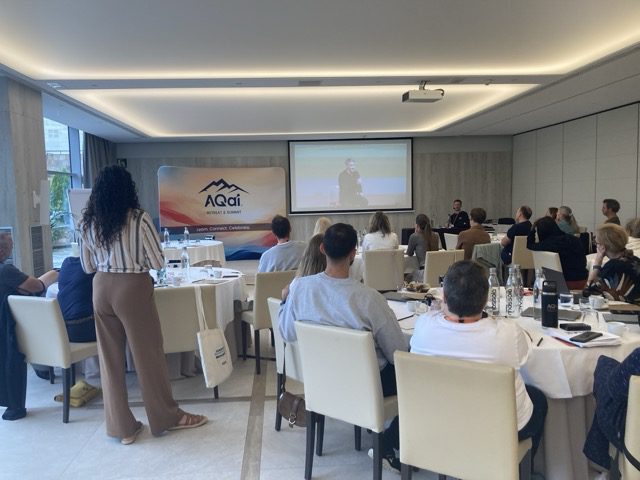The workplace has changed dramatically since the pandemic. With more teams shifting to hybrid and remote setups, the need for meaningful connection has never been greater. Enter virtual retreats, a modern evolution of traditional company retreats or offsites. Unlike standard video conferencing meetings or webinars, these structured online gatherings create intentional spaces for team building, wellness, and innovation for global teams.
At Spark Advisors, online retreats aren’t just events—they’re the heartbeat of a fully remote team working across different time zones. From internal socials to external partner events, these hands-on virtual events create opportunities for connection, renewal, and growth.
A Spark Advisors Example
At Spark Advisors, virtual retreats have become an essential part of their culture, offering connection when in-person retreats aren’t possible. Their monthly virtual retreat activities bring teammates together to share experiences that go beyond day-to-day work at their home office.
One standout event was when a team member, an accomplished baker, led a live baking session over Zoom from their own home. Colleagues not only picked up new skills but also discovered hidden talents and personalities. These moments highlight the unique power of virtual retreats to spark joy and connection in ways a typical in-person meeting or conference call cannot.
What Is a Virtual Retreat?

A virtual retreat is an online gathering designed to foster collaboration, wellness, and personal growth from the comfort of your home office. It differs from webinars, which tend to be one-way, because retreats emphasize interaction, shared experiences, and connection.
Types of Virtual Retreats
- Corporate retreats: Alignment, strategy, and team-building for small teams or entire companies.
- Wellness retreats: Yoga, mindfulness, and sleep workshops that reduce burnout.
- Educational retreats: Learning sessions, breakout discussions, or executive training.
- Social retreats: Trivia nights, virtual happy hour, or holiday contests.
- Executive retreats: Specialized programs for leadership development and strategic planning.
From In-Person to Online
Historically, retreats meant flying employees to offsite venues. With rising costs and distributed teams, companies are opting for remote retreats. Spark Advisors, for example, has successfully incorporated online experiences that support their team culture and partner community, showing how effective this model can be.
Why Virtual Retreats Work
Core Benefits for Companies
- Cost-efficient: Save on travel, lodging, and venue rentals.
- Inclusive: Contractors, remote staff, and international partners can all participate.
- Flexible: Activities can be tailored to company-wide retreats or small teams.
Real-World ROI
According to Gallup, engaged employees drive 21% higher profitability and lower turnover. Virtual retreats contribute to this ROI by strengthening culture and preventing burnout.
Mariah from Spark Advisors shares:

“Our socials give our team a fun and encouraging break to the workday. Shared interests or new activities let us connect and build culture as our company rapidly grows.”
Case Study: Spark Advisors’ Virtual Retreats

At Spark Advisors, retreats are designed around two pillars: internal connection and external community building.
- Internal socials: Hosted monthly, these range from cocktail-making classes to wellness talks with guest speakers. Their pumpkin carving contest is a team favorite—employees carve pumpkins at home, then share photos on Slack before voting on winners.
- Skill-sharing: One memorable retreat featured a teammate leading a live baking session, turning hidden talents into shared experiences.
- External webinars: Partners across the country join educational sessions, Q&A forums, and giveaways. These events go beyond sales—they strengthen trust and relationships.
Mariah explains:
“We host both internal socials and external webinars. Internally, it’s about wellness and connection. Externally, it’s about learning from thought leaders and helping partners connect with our team and each other.”
Behind the Scenes: How to Organize a Virtual Retreat
Step 1: Set Clear Goals
Decide whether your retreat is focused on wellness, team-building, learning, or partner engagement. Goals guide the format and schedule.
Step 2: Choose the Right Tools
- Zoom: Reliable for internal socials and small teams.
- lu.ma: Great for external events, with tracking, UTMs, and automated reminders.
- Miro/MURAL: Best for interactive workshops.
- Retreat software: Dedicated tools can help manage communications, agendas, and breakout sessions smoothly.
Step 3: Plan Engaging Activities
- Team-building games like trivia or a scavenger hunt.
- Creative challenges such as pumpkin carving or crafts.
- Guest speakers on topics like sleep wellness or stress management.
- Giveaways like giftcards to keep energy high.
Common pitfalls: overstuffed agendas, long sessions without breaks, and neglecting retreat communications.
Expert Insights on Virtual Retreats
Industry leaders agree that retreats only work when designed with intention.
- SHRM: Balance structured learning with play.
- Wellness coaches: Even 10 minutes of mindfulness improves focus.
- Harvard Business Review: Shared rituals build psychological safety and trust.
Spark Advisors reflects this wisdom by alternating wellness topics, socials, and skill-sharing sessions.
Choosing the Right Virtual Retreat for Your Team

How to Evaluate Providers
- Experience in facilitating corporate retreats.
- Ability to integrate wellness and team-building.
- Customization to match your company culture.
Checklist for Participants
- Test your Zoom or platform login early.
- Set up a quiet, distraction-free space.
- Bring an open mind and willingness to engage.
Trusted Resources
- Gallup for workplace engagement stats.
- American Psychological Association for stress and wellness research.
- Harvard Business Review for leadership and teamwork studies.
Future Trends in Virtual Retreats
The future of retreats blends digital innovation with human connection:
- Virtual reality (VR): Fully immersive retreat environments.
- AI-powered agendas: Personalized schedules tailored to individual needs.
- Hybrid retreats: Mixing in-person and online elements for maximum flexibility.
Mariah sees Spark Advisors expanding into:
- Department-level retreats for deeper team connections.
- Community coffee chats with partners.
- Breakout sessions featuring thought leaders.
Frequently Asked Questions
What is a Virtual Retreat?
An interactive online event designed to connect teams, reduce burnout, and encourage collaboration.
How Does a Virtual Retreat Work?
They typically use video call platforms like Zoom or lu.ma, offering fun activities, breakout rooms, virtual team building activities, and wellness-focused programming.
Who Benefits Most from Virtual Wellness Retreats?
Remote workers, growing startups, and international organizations that need cost-effective ways to strengthen culture.
Are Wellness Retreats Worth the Cost?
Yes. By reducing stress and boosting engagement, wellness retreats can deliver measurable ROI in productivity and retention.
What Are Good Virtual Team Retreat Ideas?
Cooking classes, murder mystery, trivia, meditation, icebreaker questions, craft workshops, and seasonal contests like pumpkin carving.
Can You Replicate In-Person Bonding Virtually?
While different, many companies—including Spark Advisors—find virtual retreats create strong, lasting bonds.
What Is the Average Cost of a Retreat?
Virtual retreats are far more affordable than corporate retreat locations or offsites, with costs limited to facilitation, budget templates, and activity vendors. Some expenses may even be tax deductible, depending on local laws.
Conclusion: Building Stronger Teams for the Future
Virtual experiences are more than a trend—they’re a strategic investment in culture, mental health, and collaboration for global teams. By combining inclusivity with affordability, they allow organizations to build stronger, more resilient teams.
Spark Advisors’ success proves that when virtual retreat ideas are designed with creativity and intention, they foster joy, growth, and authentic connection. Whether you’re planning for executive retreats, corporate retreat ideas, or a casual team social, the right approach can transform your team’s energy—and prepare them for the future of work.
